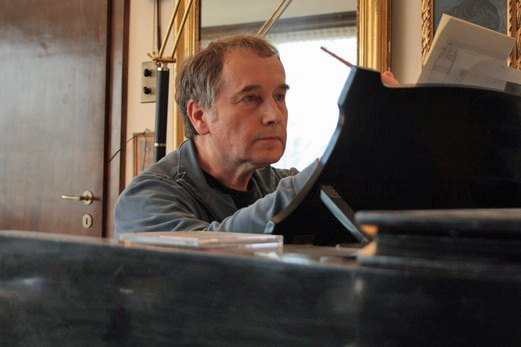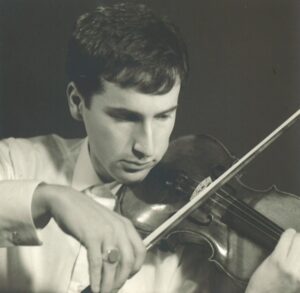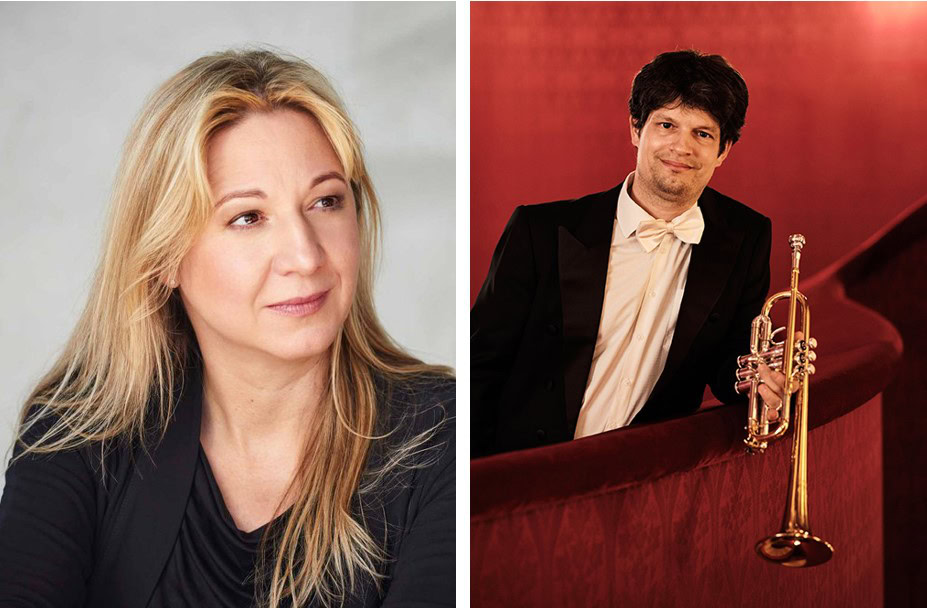Musicians, connoisseurs and collectors
Urs Joseph Flury is not only known as a violinist and composer, he is something like the musical memory of the Swiss music scene of the 20th century.

The main activity of Flury's father, the late Romantic composer Richard Flury (1896-1967), took place in the first half of the 20th century with countless contacts, and often friendships, with composers and performers from Switzerland and abroad. He maintained a lively exchange about these experiences with his son Urs Joseph, born in 1941, who in later years was present at many encounters himself; his encounter with Pablo Casals was particularly influential.
Flury's (excellent) memory therefore goes back a long way. And so it is that he knows details from the Swiss music scene extremely well: when did Scherchen leave the Winterthur orchestra, who of the orchestra musicians moved with him to Zurich? What were the (piquant) circumstances surrounding Max Reger's piano recital in Lausanne? How did the tragic relationship between Maria Schell (who was in and out of the Flury household) and the violinist Georg Kulenkampff develop? - Flury knows thousands of such details and recounts them on occasion. Flury is contacted from all sides with questions about this period. He has been asked countless times to write a book about it. Because apart from him - and after him - no one else will know.
Discoverer and preserver
Flury has always been fascinated and impressed by artists who have worked in several fields, "double talents" as he calls them. Among them are well-known names: E. T. A. Hoffmann, Jean-Jacques Rousseau or Emperor Joseph I of Habsburg. But who knew about the musical talents of Arthur Schnitzler, Annette von Droste-Hülshoff, the clown Grock, the freedom fighter and enlightener Tadeusz Kościuszko and many others before Flury dug up their works, performed them and recorded them on CD?
Through these discoveries, he saved countless works from being forgotten forever. He was particularly active in this respect with Solothurn composers: he edited and published works by Alois Glutz von Blotzheim, Casimir Meister, Edmund Wyss and Dino Ghisalberti, among others, whose catalog of works he compiled. In addition to his musical field, Flury secured the work of the Solothurn poet Olga Brand (1905-1973) with the publication of a volume of poetry in 2005.
He is particularly fond of his father's work, which is his true purpose in life. He has played and premiered countless pieces as a violinist, some of which are dedicated to him, and has orchestrated, conducted and recorded just as many on CD. With the establishment of the Richard Flury Foundation in 1996, he created the basis for the promotion of this work to be more broadly based and sustainable (www.richardflury.ch).
One of Flury's great passions is historical recordings, especially of violinists. He probably has the largest collection of recordings of the violinist Fritz Kreisler (also as a pianist!), but also of Jacques Thibaud, Aldo Ferraresi, Alfredo Campoli, Gabriella Lengyel and Georg Kulenkampff. Many labels owe him the publication of recordings. Flury has donated dozens of historical recordings to the Fonoteca nazionale in Lugano.
Composer, violinist and conductor

Flury's œuvre (www.ujflury.ch) includes vocal and orchestral works, instrumental concertos and chamber music works in a wide variety of instrumentations. With the music to the fairy tale The little mermaid (1979), generations of Solothurn children have grown up with it and countless performances have taken place, with and without ballet. The sacred works set to texts by Beat Jäggi (Soledurn Wiehnechtsoratorium and Passion in Solothurn dialect) and, more recently, compositions commissioned by the Solothurn choir, The frozen people and Four songs for the annual cycle. He considers his best instrumental work to be the symphonic poem Vineta. Flury's cello concerto exists on CD with the soloist Pierre Fournier, the violin solo sonata with Ruggiero Ricci, the violin concerto in D with Alexandre Dubach. The Romantic piano concerto (with Margaret Singer) is a "perennial favorite" on Radio Swiss Classic. Many chamber music compositions are in print.
A pupil of Walter Kägi and Hansheinz Schneeberger, Flury was in demand as a soloist and chamber musician from the 1960s onwards. In 1966/67 he was concertmaster of the Camerata Biel and from 1965-1968 a member of the Basel Chamber Orchestra. He taught violin at the city schools in 1967 and at the cantonal school in Solothurn from 1968 to 1998. From 1967-1972 he was a violin and theory teacher at the Biel Conservatory.
He has conducted the Solothurn Chamber Orchestra since 1971 and also led the Orchestre du Foyer Moutier from 1970-2016. In his programs, he avoids the "big" works that every music lover knows well and that an amateur orchestra generally cannot really master. He prefers to focus on rarities by great masters or works by Solothurn composers, usually premieres and often orchestrated or arranged for the requirements of the orchestra.
Urs Joseph Flury was awarded the Art Prize of the Canton of Solothurn in 2016 for his extensive musical activities.








